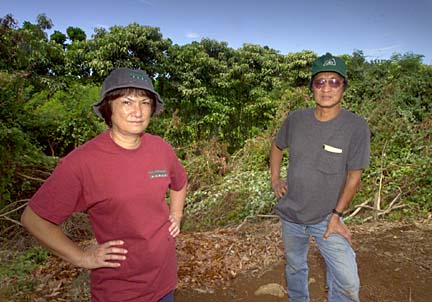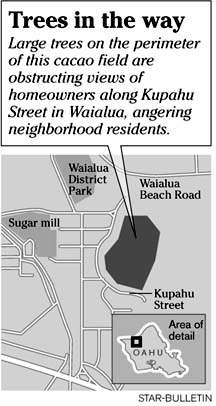

|
Raising Cane Rob Perez |
Legislature OKs bond bill
despite farm’s feudsFrom their back yard atop a Waialua hillside, homeowners Lavina and Milton Agader used to have a prized ocean view, all the more enjoyable because of the tradewinds that provided a cool breeze even on hot summer days.
That ocean view is no more. Instead of sparkling blue waters in the distance, the Agaders see a wall of green -- up close.
For the past several years, wili wili and kukui nut trees have grown ever higher on the border near the base of their property, slowly stealing the very view that prompted the couple to purchase the residence 25 years ago.
With the trees reaching heights approaching 40 to 50 feet, forming a wall along the Agader property and other residential lots on Kupahu Street, the vegetation not only has obstructed views but has partly blocked the tradewinds.
The affected neighbors are angry. They've signed a petition and have asked area politicians for help.
But not only have legislators been of little help so far, they've supported giving state assistance to the company at the root of the problem.
DENNIS ODA / DODA@STARBULLETIN.COM
Lavina and Milton Agader stand in front of a wind break of trees that blocks their view of the ocean from their home in Waialua. A Big Island agricultural company is leasing the land with the trees and refuses to trim or cut them down. Milton says the trees are useless as wind breaks.
That only adds to the neighbors' frustrations.
"We thought we would have this view forever," Milton Agader said, motioning in the direction of the ocean behind the green canopy of trees. "Now this."
The "this" Agader was referring to, besides the thick crop of trees, was the escalating feud between the Kupahu neighbors and the Big Island company, Hawaii Gold Cacao Tree Inc., that is leasing the former sugar cane land below the homes to grow cacao. The landlord, Dole Food Co., which planted the trees in the late 1990s to serve as a wind break for the cacao crops, also has been dragged into the mess.
And that's just half the story.
The tree controversy is raising questions about how much scrutiny legislators give to requests for state bond authorizations from private companies.
Even as the feud between the Waialua residents and Hawaii Gold Cacao was heating up, lawmakers earlier this year unanimously approved a measure that extends the time in which the state can issue $10 million in special purpose revenue bonds (first authorized in 2000) on behalf of the Big Island company.
While Hawaii Gold was being touted by the Legislature as a success story for its cacao work, Dole was seeking court permission to evict the company for nonpayment of delinquent rent on the Waialua field. A district judge in late February approved an order allowing Dole, owed more than $20,000 as of December, to take back the property.
And even before the legislative session began (it runs from January to May), several former Hawaii Gold workers who tended the cacao field told Waialua residents that the company hadn't paid them for about three months of labor. Fed up, the workers eventually quit.
One of the laborers, Abraham Vallente, said the company still owes him nearly $4,000 for work he performed from July through September of last year. He said two of his former co-workers also are owed money. One of them, Roberto Matias, said he complained to the state Department of Labor and Industrial Relations, but has yet to be paid.
The problems the company were having in Waialua were not secret when the Legislature was in session. The court case was public (I found it online in less than a minute), the flap with neighbors was becoming more high profile (homeowners sought assistance from several politicians) and the former field workers had told Waialua residents, the state and a county-affiliated job training agency about their predicament.
Yet not a single legislator voted against the bond authorization bill. The main sponsor of the measure, Big Island Sen. Lorraine Inouye, professed ignorance of the company's problems when I told her about them. "This is something new for me," she said.
What's ironic about the legislative approval is that Senate President Robert Bunda, who represents the Waialua area and supports the Kupahu neighbors' efforts, has been involved in trying to help resolve the tree problem.
His office coordinated a meeting last September, wanting to bring together the neighbors, Dole and the Big Island company. No one from Hawaii Gold showed up.
That and other actions by Hawaii Gold upset Bunda. "I was really taken aback by them not cooperating," he said.
Yet several months later, as the bond bill was moving through the legislative process, Bunda said he had been told that Hawaii Gold's disputes over the trees, rent and wages had been or were being resolved.
"I thought things were being worked out," Bunda said.
Indeed, Dole documents provided to the homeowners indicated the company had worked out a settlement with Hawaii Gold over the rent issue, and at one point the residents had told Bunda's office that the tree dispute looked like it was going to be resolved, although that turned out not to be the case.
A Hawaii Gold representative declined comment. He told me the company's private business dealings with Dole are not for public consumption. (Dole didn't respond to requests for comment, either). The Hawaii Gold spokesman also said the two days I gave the company to respond to my inquiries last week weren't sufficient.
Excuse me for being a little skeptical. How tough is it to research why your rent and workers weren't paid? And if a company is seeking state assistance to float bonds, any company developments that suggest financial troubles are definitely the public's business.
Of course, the fact that the Legislature approved -- and Gov. Linda Lingle signed into law -- the bond bill doesn't put the state at risk financially. Even if the company is able to complete its requirements for a bond issue, the state still would have to do a thorough evaluation, called due diligence, before the bonds actually are sold to investors. And even then, the state would only be lending its name, not financial backing, to the bonds.
But even that shouldn't be done lightly and comes with risk to the state's good name in financial markets, something that matters greatly whenever the state borrows money through bond sales.
How, then, could the Legislature so easily approve a bond bill if there were hints of financial trouble that lawmakers could have discovered had someone made even nominal checks?
Inouye said several public hearings were held on the bill, and no one mentioned the difficulties Hawaii Gold was having in Waialua. "We felt comfortable with what the (company) had told us" about its operations.
If she had known about the problems, Inouye said, she probably would have deferred the bill, started an inquiry and then decided what to do.
As it is, the state administration will conduct due diligence before any bond issue is floated, Inouye said. "We're only the first layer of the process," she said.
That, unfortunately, is of little consolation to the Kupahu homeowners whose views or tradewinds are partially blocked or who are concerned about what will happen if the trees are allowed to grow higher.
"Eventually, I'll see nothing from this view," said Mike Miller, who has lived in the neighborhood about a year and estimates the trees have grown 5 feet in that time.
Ron Yoshida, a 34-year resident of the neighborhood, said the problem could hurt homeowners financially. "If we were to sell our home, all this would weigh negatively on the sale," he said.
Milton Agader, who worked for Dole for 31 years before retiring in 2001, said he raised concerns with Dole when the trees, then only a few feet, were originally planted four or five years ago, before Hawaii Gold began leasing the land.
Not only was he concerned because, as a farmer, he knew they would grow to considerable height, but also Agader said the perimeter trees weren't in the right place to provide wind protection for the cacao.
Earlier this year, Dole told homeowners it would be responsible for having the trees trimmed, and arrangements were made to do the cutting in early June.
But on the day Dole officials and a contractor went onto the property, a Hawaii Gold representative threatened Dole with legal action if they cut the trees, Milton Agader quoted a Dole official as telling him. Dole has since told the residents that they need to resolve the issue with Hawaii Gold.
The residents likely can't turn to the courts for help. Hawaii law does not provide protections for hillside views, although newer subdivisions may have such protections written into deeds and covenants, legal experts say.
Agader has come up with his own potential solution. He's offering to purchase the 25-acre parcel from Dole and take that over. Agader already farms land leased from Dole.
Who knows how all this will play out. But for the residents' sakes, Bunda believes Dole and Hawaii Gold should be good neighbors and arrange to have the trees trimmed.
For now, that seems like the most reasonable solution.
See the Columnists section for some past articles.
Star-Bulletin columnist Rob Perez writes on issues
and events affecting Hawaii. Fax 529-4750, or write to
Honolulu Star-Bulletin, 500 Ala Moana Blvd., No. 7-210,
Honolulu 96813. He can also be reached
by e-mail at: rperez@starbulletin.com.

